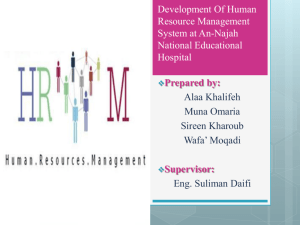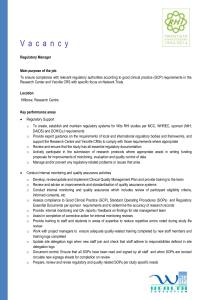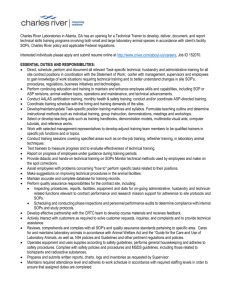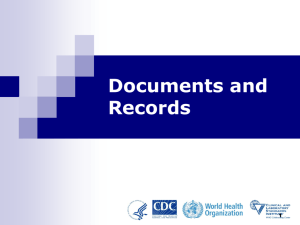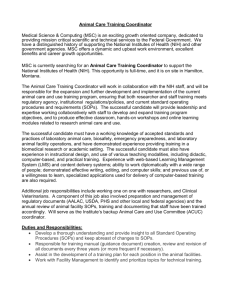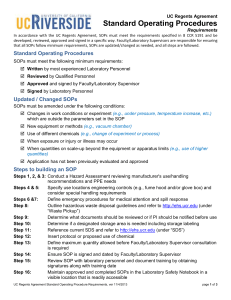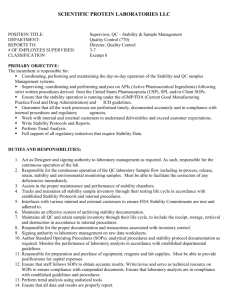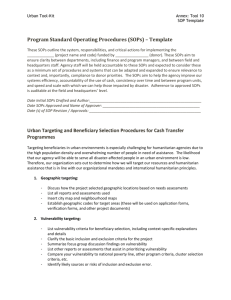Quality Assurance and Quality Controlin the
advertisement
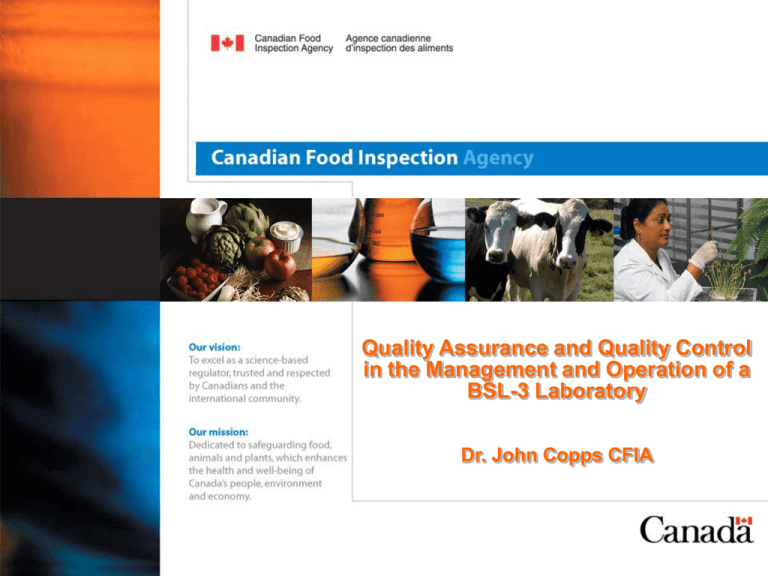
Quality Assurance and Quality Control in the Management and Operation of a BSL-3 Laboratory Dr. John Copps CFIA Why Me ? John Copps DVM DVSc 1. 10 years experience in a functioning BSL-3 and BSL-4 Laboratories 2. Laboratory ISO/IEC 17025 accredited since 2002 3. Deputy Director of the National Centre for Foreign Animal Disease 4. Reviewer for the Regional Biological Containment Laboratories of the USA 2 Theory of Quality Quality Assurance (QA) is defined as part of quality management focused on providing confidence that quality requirements will be fulfilled. http://www.aoac.org/terms.html (ISO 9000:2000 3.2.11) 3 Theory of Quality Quality Control (QC) is defined as part of quality management on fulfilling quality requirements http://www.aoac.org/terms.html (ISO 9000:2000 3.2.10) 4 Total Quality Management (TQM) Total Quality Management is defined as a management approach that tries to achieve and sustain long-term organizational success by encouraging employee feedback and participation, satisfying customer needs and expectations, respecting societal values and beliefs, and obeying governmental statutes and regulations. The best form of TQM applies QA and QC in the process of making quality outputs 5 Objectives of a BSL-3 Facility with regard to QA and QC Objectives of a BSL-3 Facility are: 1. A Quality Output (diagnostic, report, data) 2. Protection of the Public, Staff, and Environment 3. Maximize Efficiency 6 7 Why Are These Objectives Important 1. To allay fears that the general public and regulators have expressed due to recent accidents within the bio-containment community. QA/QC can be an assurance communication tool. 2. Training in basic biological safety deemed essential in BSL-3 and BSL-4 laboratories. Eg. WHMIS, Biological Safety, Training recorded and verified can be based on QA/QC. 3. New requirements which advocate for a thorough understanding of “exposure” and creating medical management on and off site. QA/QC will aid in standardizing responses. 4. The facility management, the public and regulators insist on security measures which protect people and the assets of a facility. QA/QC processes will provide reassure the public. 8 An Example of Why QA/QC is Relevant to work with Exotic Agents such as Avian Influenza. PROJECT: XYZ Laboratory has contacted your BSL-3 LAB called NCFAD (ISO/IEC 17025 Accredited): To develop a PCR Test for 1. Matrix protein Within 1 year March 2008-2009 9 Project Management and QA/QC Requirements of our QA/QC system SOPs and Policies: (Assuming all negotiations and legal signed off) 1. All projects in the Lab have a “Project Profile” 2. A signed internal document for a statement of work 3. The purpose of the project profile is to 1. Outline the scope of work - outputs 2. Identify the collaborators, units and personnel which are asked for a product 3. Identify the funding requirements for each phase 4. Identify the project leader 5. Identify the timelines 6. Identify the “Go + NO GO” critical points in the project 10 11 Project Management and QA/QC Import or Export Permits Required for Avian Influenza SOPs are written to outline the procedures of 1. Who has to authorize the permit, and who will use the permit 2. What quantity you will be using, what will be stored and where 3. When will the project will be run 4. Where to apply and where you will use the AIV, Where is the project going to be run 5. Why you want to use the AIV. 6. How to fill out the permit 12 13 Project Management and QA/QC Virus Storage and Inventory 1. Policy on who can access the Avian Influenza 2. SOP covering entry of the virus into an inventory system 3. SOP covering how the virus is stored including emergency procedures for freezer breakdown 4. SOP on how a virus is removed 5. SOP on reporting of entire virus stock 14 Project Management and QA/QC Staff Working on the Avian Influenza Project 1. Policies and SOPs for BSL-3 medical and security 2. SOPs policies on safety training to enter BSL-3 3. SOPs on access, entry and exit procedures 4. SOPs on emergency evacuation (fire, air flow, threats) 15 Project Management and QA/QC Staff Working on the Avian Influenza Project SOPs and Policies indicate: 1. How a person is considered competent to do the work. (combination of credentials and onsite training) 2. Laboratory Notebook SOP – (The Data which is essential to the validation of the Test Methods) 3. Quality of reagents and supplies (purchasing, storing, thawing) 16 Project Management and QA/QC Animal Work to supply known positive samples fro PRC 1. SOPs/Policies for animal acquisition 2. 3. 4. 5. through an Animal Care Committee SOPs for animal procedures (eg. inoculation, blood, swabs and tissue sampling) SOPs for removal of samples to the laboratory for analysis SOPs for animal records and clinical signs SOPs and policies acceptable for Governing Bodies (CCAC, AALAC, NIH, PHAC, CFIA) 17 Project Management and QA/QC Data 1. SOPs/Policies for reports and report content stipulated in the Project Profile 2. SOPs of Data storage short term (who has access) 3. SOPs on data Archiving (for how long, in what form) 18 Project Management and QA/QC Under a QA/QC systems: Equipment 1. Maintained according to SOPs generated from manuals 2. SOPs -Records of daily monitoring (eg temperature of the fridge) 3. PCR – SOP for operation and maintenance of light cycler (eg cut off points; # of cycles) 4. SOPs - Availability of a equipment (“In service – Out of service”) 19 Project Management and QA/QC During the Study AUDITS ! The purpose of audits are to insure ongoing quality for all aspects of the project from start to completion, and to ensure the quality and reliability of the output data after the project. Internal Audits Internal Audits by trained employees will ensure the QA/QC Day to Day operations are performed to laboratory SOPs and Policies. “Continuous Improvement” External Audits External Audits ensure the entire facility is operating to a standard. Accreditation. 20 21 Project Management and QA/QC Behind the Scenes Facilities 1. Monitoring of Temperature, Humidity, Air Pressure throughout the entire experiment. 2. Reporting according to SOPs of Temperature, Humidity, Pressure throughout the entire experiment and recording of parameters outside set points. 3. SOPs/ Policies on maintaining the building infrastructure (eg. Life Cycles, Crack and Penetration procedures) 4. SOPs and Polices for Emergency Repairs within containment or on systems affecting contained areas during the project. 22 Project Management and QA/QC Behind the Scenes Facilities (Hidden Policies and SOPs) Facilities may run under different format of ISO Certification/Accreditation (Eg. ISO 9000) 1. SOPs for HVAC system of cleaning, checking, replacement (HEPA filters, Belts, Fan motors) 2. How will these procedures affect Program operation. SOP/Policies on work orders 3. SOPs for Waste Removal 1. Building wide standardized procedures, solids, liquids, plastics 2. Meet all of the federal, provincial (state), and municipal laws 3. Acceptable to the public 4. Incineration, autoclaving, chemical treatment, gas treatment 23 Project Management and QA/QC Behind the Scenes Facilities Security 1. Standardized security clearance policies. - acceptable to management, public, regulatory bodies 2. Standardised security “incident” responses - SOPs understood and practised by all staff - SOPs/Policies limited access, lock down, computer access 24 QA and QC Role in the Final Output 1. Management is assured of the project’s output and 2. 3. 4. 5. has been appraised of all issues and problems Collaborators agree to and understand the quality of the output Funding agencies are aware of the quality of the product Governing Agencies are aware and understand the quality and safety of the output General Public reassured monies spent were for a quality output in a safe manner 25 Project Management and QA/QC Safety SOPs and Policies P R O J E C T Equipment SOP Facility SOP Staff SOP Lab Data Repeatability & Reliability Protocols Quality Output For Management/Public Suppliers Collaborators Other agencies Collaborators Agencies/Regulators 26 BSL-3 Funding of Containment Operations Canadian Federal Government Experience 1. Not in the business of generating revenue 2. Maintains and operates our laboratory for 3. 4. 5. 6. Diagnostic and Research within our Scope and Mandate (test improvement) Stimulates Collaboration with other National BSL-3 and BSL-4 laboratories world wide Stimulates Collaboration with Universities and research centers world wide Stimulates Collaboration with other agencies within the Canadian Government Uses the facility to train veterinarians and laboratory staff 27 Present Sources of Funding 1. Facility Costs Operations of Facility, Diagnostic Testing, Equipment and Salary Overhead Canadian Government 2. Research and Collaborations Supplies, Project Staff, Consumables, Equipment Stand Alone Grants, Collaborative Grants, In Kind, Fee for Service 28
